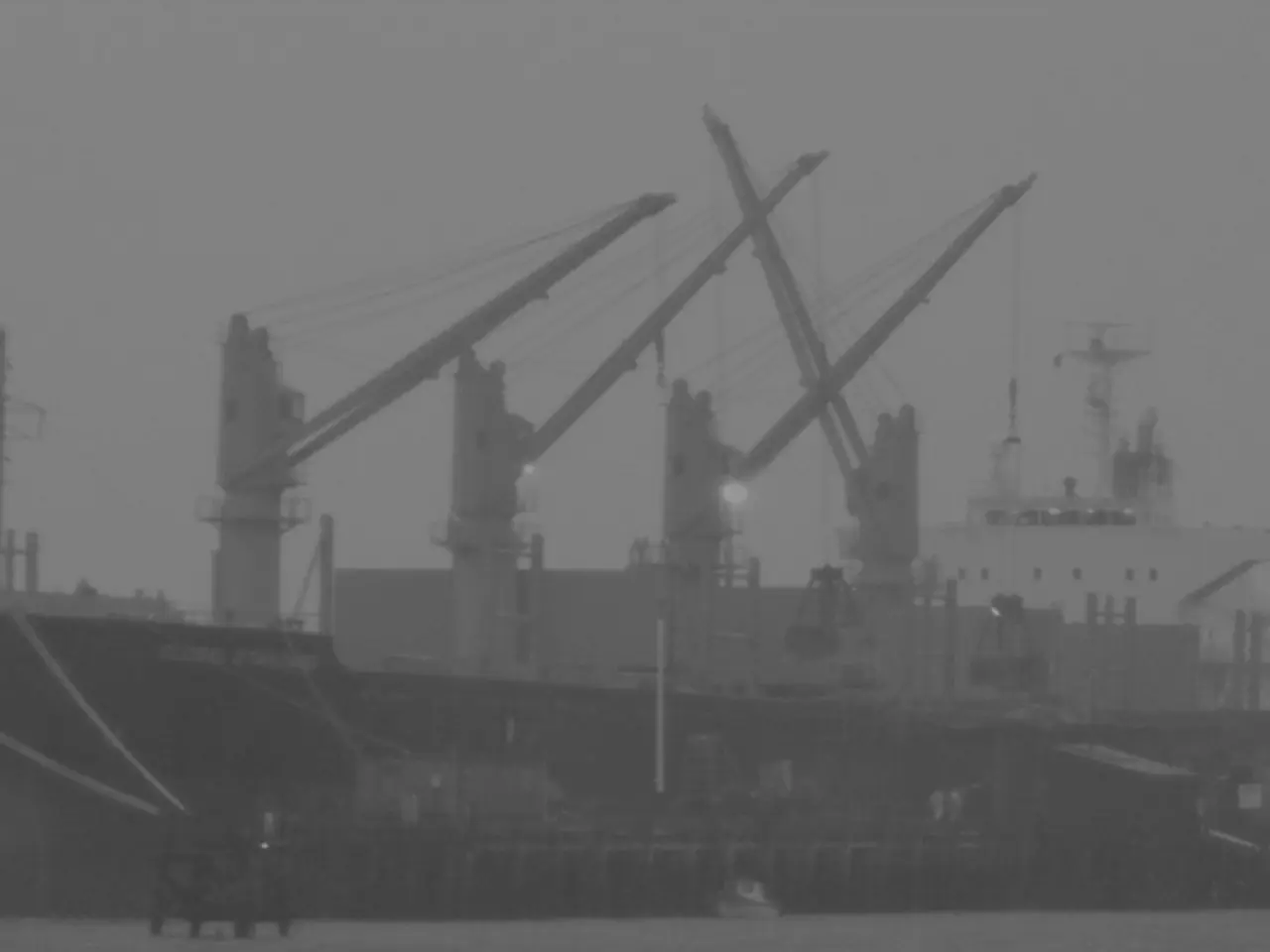U.S.-South Africa shipping service to be discontinued by Maersk, leading to escalating expenses and potential delays for exporters
Maersk, a leading shipping company, has announced its decision to discontinue its direct shipping service between South Africa and the United States from October 1, 2025. This move is due to Maersk's upcoming shift to the new Gemini alliance with Hapag-Lloyd.
The discontinuation of Maersk's service is expected to have significant repercussions for South African exporters, especially those in time-sensitive sectors such as fresh fruit and wine. The change will result in longer delivery times and increased costs, as goods will now be routed through European transshipment hubs instead of being shipped directly.
One of the key impacts of this change is the extended transit times. Cargo will be offloaded in European ports, then transferred to another vessel to cross the Atlantic, extending overall delivery durations. This could result in delays of 7-14 days or more due to additional port handling and potential congestion in European hubs.
The higher shipping costs associated with the new route are another concern. Additional handling and transshipment increase operational expenses, which exporters may bear directly or indirectly. Moreover, additional transshipment charges, fuel surcharges, and handling fees are expected to raise freight rates significantly.
The vulnerability of perishable goods is another significant issue. Time-sensitive exports like fresh fruit and wine rely on fast, direct shipping to preserve quality. Transshipment adds unpredictability in waiting times that can lead to spoilage or reduced shelf life.
With Maersk’s exit, Mediterranean Shipping Company (MSC) remains the sole direct carrier on this route. Although MSC plans to expand capacity, it is uncertain whether it can absorb the full demand previously served by Maersk, potentially straining supply chains. This could leave exporters with reduced bargaining power and limited alternative options if schedules are disrupted.
The maritime business chamber has cautioned that depending on a single direct service creates risks related to service disruptions and global market fluctuations. In response, Maersk and other stakeholders are pushing for incentives for other carriers to enter the market and restore competition.
Proposed regional trade infrastructure improvements include enhanced port efficiency and new direct trade agreements with alternative shipping lines. South African trade organizations are urging action to mitigate the fallout from Maersk's withdrawal.
Exporters are advised to plan ahead, diversify shipping options, and build time buffers into their supply chain schedules. The change in trade dynamics between South Africa and the United States due to Maersk's decision could threaten South Africa's competitiveness in critical sectors.
The development underscores a broader challenge facing global shipping: increasing reliance on fewer carriers for long-haul routes, leaving economies vulnerable to sudden changes in service availability. Exporters and shipping stakeholders alike should remain vigilant and proactive in navigating these evolving trade dynamics.
[1] BusinessTech. (2022, September 26). Maersk to discontinue direct shipping service from South Africa to U.S. from October 2025. Retrieved October 03, 2022, from https://businesstech.co.za/news/transport/709354/maersk-to-discontinue-direct-shipping-service-from-south-africa-to-us-from-october-2025/
[2] Fin24. (2022, September 26). Maersk to discontinue direct shipping service between South Africa and the US. Retrieved October 03, 2022, from https://www.fin24.com/Economy/maersk-to-discontinue-direct-shipping-service-between-south-africa-and-the-us-20220926
[3] IOL Business Report. (2022, September 26). Maersk to withdraw from SA-US shipping route. Retrieved October 03, 2022, from https://www.iol.co.za/business-report/companies/maersk-to-withdraw-from-sa-us-shipping-route-2022-09-26
[4] News24. (2022, September 26). Maersk to discontinue direct shipping service between South Africa and US. Retrieved October 03, 2022, from https://www.news24.com/business/companies/maersk-to-discontinue-direct-shipping-service-between-south-africa-and-us-20220926
- The global logistics market may see changes as Maersk, a leading shipping company, discontinues its direct shipping service between South Africa and the United States.
- The extended transit times due to Maersk's decision could impact the lifestyle of consumers, especially when it comes to importing fresh produce from South Africa.
- Technology advancements in container tracking and communication systems could help exporters manage the increased delivery times resulting from Maersk's shift in strategy.
- Businesses dependent on exports to the US are expected to incur higher costs due to the new shipping route following Maersk's decision, potentially affecting their financial stability.
- Africa's supply chain will be affected by the alteration in the shipping trade route between South Africa and the US, as Maersk's decision might disrupt the import and export of goods.
- Infrastructure investments in ports may help accommodate the enhanced cargo volumes from MSC, the remaining direct carrier on the South Africa-US route, following Maersk's departure.
- The sports industry, which relies on timely deliveries of equipment and merchandise, could face challenges due to the extended delivery times caused by Maersk's discontinuation of service.
- Stakeholders in the global trade community are calling for incentives to attract more carriers to the South Africa-US shipping route, ensuring a competitive market and balanced supply chain.
- The dismissal of Maersk's service could lead to a shift in the market share among shipping companies, enabling alternative carriers to gain a foothold in the transatlantic trade.
- The players in the sports, technological, and business sectors should pay close attention to the evolving trade dynamics between South Africa and the United States due to Maersk's decision and be prepared to adapt their strategies accordingly.




